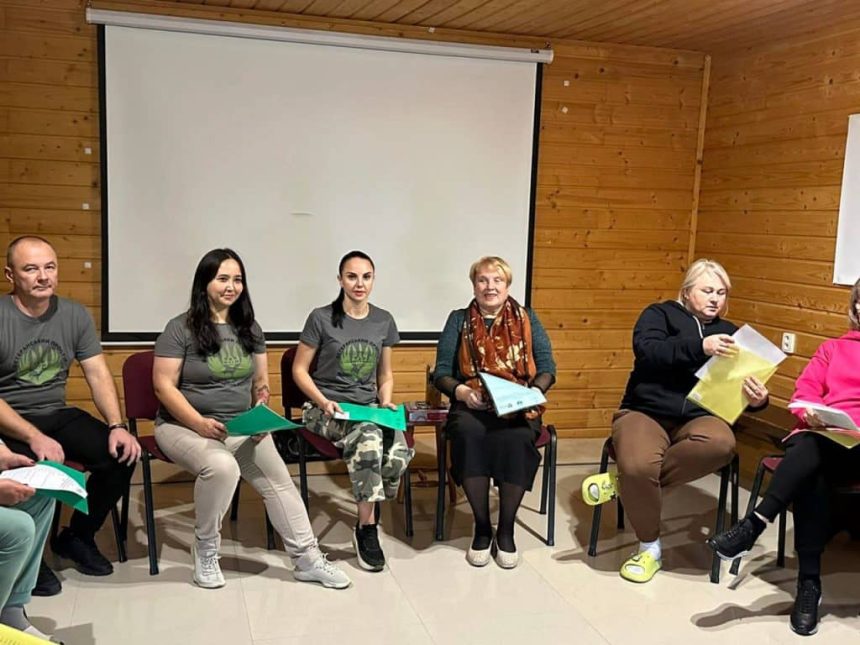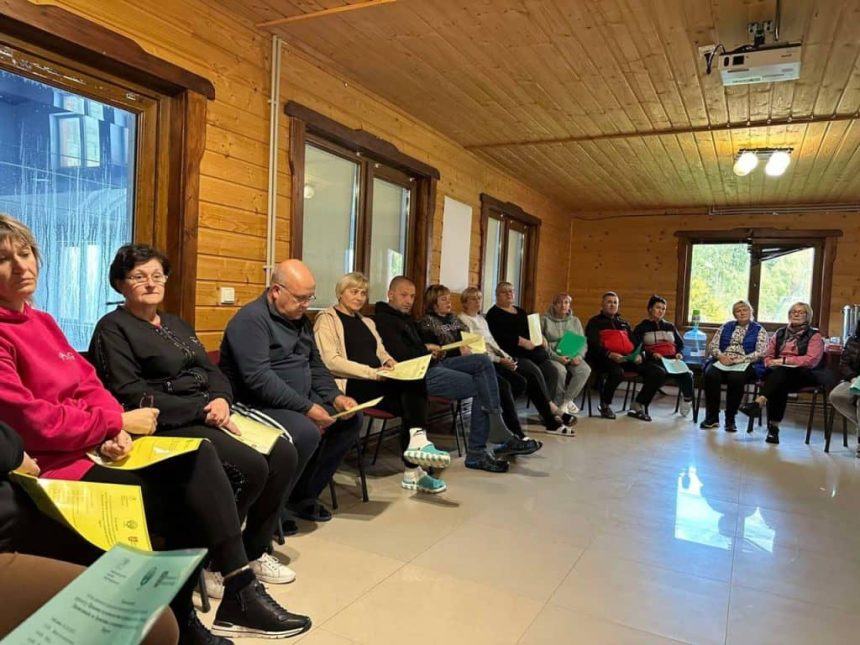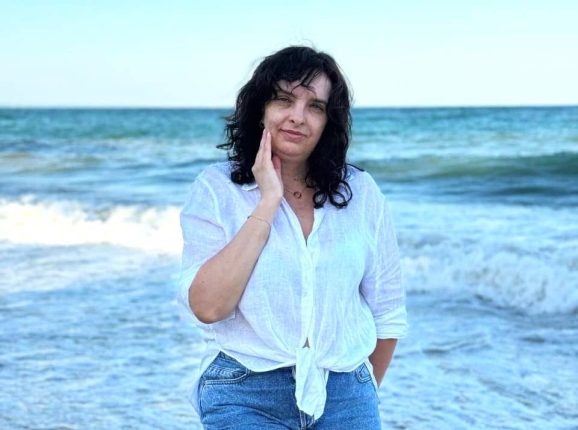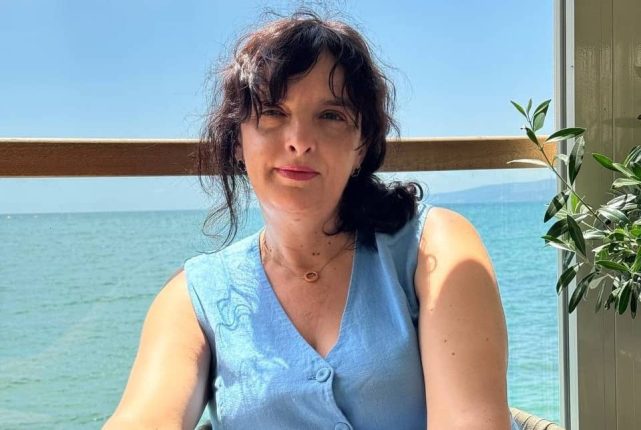
The strength to move on: support to war veterans and families of fallen soldiers in Ukraine
09/09/2024
Imagine the grief of a wife who lost her husband in the war, the anxiety of a mother whose son is a prisoner of war or the frustration of a wounded soldier who – upon return – has to confront long procedures to confirm his injury. In Ukraine, the number of such people is growing every day. A local NGO in Vinnytsia – the “Veteran Space” – has the problems and needs of these people at heart. With EU support, it provides physical rehabilitation, psychological and legal support, as well as social and household counselling to veterans and the families of fallen or missing soldiers.
“I have fought since 2014,” says Vadym Lisnychenko (42) from Vinnytsia, a war veteran. He served three rotations but at the end of the last one he was injured in a car accident and discharged with a disability. However, when the full-scale invasion started, he returned to the front. On 5 April 2022, he was wounded in the village of Solodke, south of Mariinka. “Our observation post was shelled, and I was hit by the shell fragments. That time I was wounded more severely: I couldn’t feel my leg. After six months of rehabilitation, my nerve did not recover, and I was discharged.” In spring 2023, Vadym addressed the Vinnytsia Analytical and Educational Centre “Veteran Space”, which offered him the free services of a rehabilitation therapist. “Two years have passed since I was injured, I thought nothing could help me. But the rehabilitation therapist started working with me, and – even if I still cannot move my toes – I started to feel my foot again,” Vadym explains. “Moreover, the NGO’s lawyer helped me to receive compensation for my injury, as stipulated by the law.”


Vadym has been familiar with the “Veteran Space” Centre in Vinnytsia since its creation in July 2020. Upon return from the combat zone, he – like many wounded soldiers – found himself “fighting” again – this time, for his rights and social guarantees. “Returning veterans do not have enough support. They are often unaware of their rights, which procedures to follow after the injury, how to obtain an injury certificate,” says Mariia Dovzhyk, the Centre’s Executive Director. “Therefore, we created a project with group consultations directly in medical institutions. We help them to draft the reports to obtain certificates. We have involved both a lawyer and a social manager who served for many years in the Armed Forces and understands the mechanisms well.” Thanks to the knowledge and experience gained, the “Veteran Space” has issued a road map titled “It’s worth knowing”, which highlights five key points that wounded soldiers need to know during their treatment and rehabilitation.
The EU support via the International Renaissance Foundation was more than crucial to focus on the needs of war veterans. The NGO has managed to build a community, uniting people with similar war experience, offering physical rehabilitation and facilitating their reintegration into society. Mariia remarks: “After 2022, we started to build a community of new veterans. We plan various activities – from river rafting to a financial cashflow game – to bring them together. In this, we closely collaborate with the local authorities and with the regional military administration.”
With the start of the full-scale invasion, the Centre felt the need to expand its activities to new target groups. “We have introduced support groups for those who are waiting for their loved ones, who have lost them at war, separate groups for parents and for wives. We have expanded our psychological work to children,” the Director explains. More time and resources were dedicated to psychological consultations, work with families of missing soldiers and prisoners of war, preparing territorial defence groups and volunteers.
Maryna Bahulova is 44. She lives with her daughter (21) and her seven-year-old son. Her husband Serhii Bahulov fought from the first day of the conflict in 2014. In February 2022, he took part in the defence of Kyiv and the Kyiv region, and several months later he signed a service contract. In July 2022, when her husband was fighting for Sievierodonetsk and Lysychansk, Maryna met other women who were waiting for their husbands’ return. By chance, Maryna came across a Facebook message from the Vinnytsia Centre “Veteran Space”, inviting military wives to a meeting. “I was excited to join,” recalls the woman. “The meetings were held every week, and we talked about ourselves, our loved ones, our children.” But one day all her hopes were blown to pieces.
“On 22 October 2022, just four days before his first rotation, my husband was killed in a battle with the Wagnerites, saving his comrades,” says Maryna. “I was the first one in our group to lose a husband, and from that moment I could no longer attend the meetings. It would have been too difficult for me to talk to other women whose husbands were still on the front line.”
Sharing the feelings of Maryna and other wives of soldiers killed in action (KIA), Mariia Dovzhyk organised a new support group. It has become a place where the women can confide in each other and discuss their pain, but also share useful information on the available social assistance, as – with the death of their husbands – many wives had lost their livelihood. The Centre’s lawyer advised them on how to receive KIA status, financial aid and state guarantees, developing a step-by-step guidance for the families of fallen soldiers.
Taking care of the psychological and mental well-being of the families of fallen soldiers, “Veteran Space” offered individual sessions with a psychologist both for adults and children. It also organised a psychological retreat for a group of KIA wives in the Carpathians, which included in-depth work in psychological groups alternating with body care, art therapy, excursions and other joint activities.
Psychological support was crucial for one more target group which usually receives less attention – the mothers and fathers of victims – who experience their loss differently.The Centre involved them in activities which helped them to know each other better, to exchange and, most importantly, to shift their perspective from living with the loss to something different. Excursions and art therapy, yoga classes and a psychological retreat have built the community of over 60 people, and it is still growing. “We have a father of 55, who in the beginning was very silent and sceptical about psychology. But when he visits the Space, he smiles, speaks from his heart, reflects upon his feelings. This is a great achievement to remember,” concludes Mariia.
The NGO is carrying on its initiative with great devotion and high professionalism. But it also aims to diversify its support to target groups. Thus, it has been pushing to include trainings for veterans and KIA family members on writing business projects in the regional programme (accessing local-level grants). Such trainings would provide them with new opportunities and also enhance their chances to access grants from the Ukrainian Veterans’ Fund, a state programme under the Ministry of Veterans Affairs of Ukraine.
Author: Volha Prokharava
Stories
-
Katarina Mathernova: If Ukraine had a human face and a human spirit, it would be 10-year-old Roman Oleksiv
-
A regional mission to drive social entrepreneurship: the story of Ksenia Kosukha
-
EU restores safe water supply for 100,000 Ukrainians affected by war
-
Promoting IT during the war: Lviv IT cluster and how EU4Digital helps
-
Frontline digitalisation: Kharkiv IT Cluster collaborations
-
How EU4Youth is driving opportunity and success among young Ukrainians

